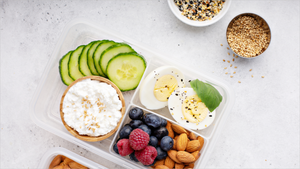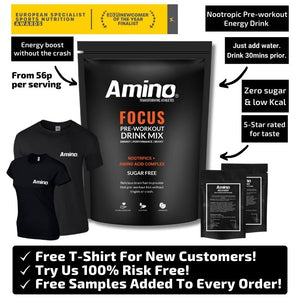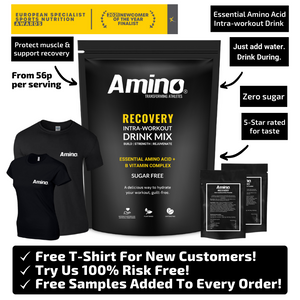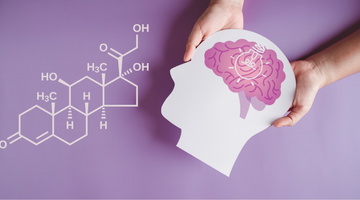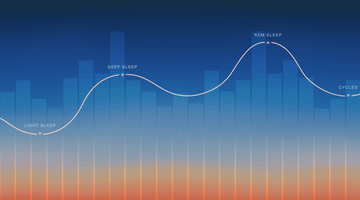There are a lot of misconceptions about what to eat before and after exercise. Some experts recommend that you eat before working out, while others suggest that you can work out on an empty stomach. The truth is that what and when you eat can really affect how successful your workout will be and your fitness goals. Therefore optimising your pre-and post-workout nutrition is super important. This blog article will go through the basic science of eating before and after exercise, as well as 8 suggestions for what to eat before and after a workout so you can get the most out of your workouts!
Should you eat before a workout?
Generally, we say yes however everybody is different and so are their fitness levels and goals. To answer this question it is important to understand what's happening in the body when you do 'fuelled exercise' as opposed to 'fasted exercise'.
What is fasted exercise?
Fasted exercise is when you don't eat anything before and during the workout. The reason for this is that fasting before a workout has been shown to improve focus, increase muscle protein synthesis, and lead to greater fat loss. [1, 2]
However, this doesn't mean everyone should roll out of bed and going straight for a high-intensity cardio session first thing in the morning. You may have the energy for a low-intensity or a short HIIT workout on an empty stomach but it may not be the best approach if you want to crank out 6-minute miles.
So what's happening in the body when you fast? When we do not feed ourselves, our blood sugar levels will drop. A prolonged absence of food brings about a reduction in circulating blood sugar, causing glycogen (or stored carbohydrates) levels to fall. That leaves your body no choice but to rely more on fat, rather than glucose, to fuel workouts, especially those that last 45 - 60 minutes. In simple terms, this means that when you perform your cardio on an empty stomach your body favors burning fat instead of carbs.
Something to be mindful of though, there may be fat-burning advantages to fasted cardio; however, in the end, it comes down to energy balance (calories consumed - calories burned) over time for weight or fat loss. In the end, the overall number of calories we burn during our workout plays a bigger factor, and we are more likely to burn more calories during higher intensity workouts.
Most individuals are not able to do high-intensity interval exercise while fasting since they wouldn't have sufficient energy or would feel dizzy during or after. It could also make you more likely to injure yourself.
Therefore, our advice is to try and eat before a workout however I know that realistically you won't always have the time (or desire) to eat before a workout. On nights when you're scrambling to get from the office to your favorite studio for that 6:00 p.m. class it might feel impossible to squeeze in a snack on the way. And what do you do if you're a morning workout person who doesn't like to eat breakfast? (Psssst: Despite all of the most-important-meal-of-the-day talk, it's OK to skip breakfast.)
In summary, if you're not fasting or working out at night, it's important to try and have some fuel on hand when your workout begins. However, if you're going to be doing a low-moderate intensity workout, it's usually fine not to eat first - listen to your body and how it responds to your activity.
What is fuelled exercise?
Fuelled exercise is when you eat food around an hour before your workout. When it comes to fueling your workout your starting point is always a healthy balanced diet. And from there making the tweaks necessary depending on your fitness goals. The fuel you eat gives you energy needed to complete the tasks effectively, so it’s hugely important to ensure your body is properly fuelled at all times to prevent injury and maximise performance.
Nutritionists recommend that you eat a full meal around two to three hours before engaging in high-energy workouts, one that is typically higher in carbohydrates. [2]
Research suggesting that fuelled, or ‘fed’ exercise can boost your ability to workout [4] for longer periods of time, therefore leading to better results.
Properly fuelling yourself before and after exercise leads to better performance as well as reduced risk of injury. If you don’t get the nutrients your body requires around the hours of exercise, you are putting yourself at risk of fatigue. And nobody wants that.
How and what should you eat before working out?
1. Time your pre-workout snack right.
How long should you wait after eating before your workout? The length of time you should wait after eating before exercising varies by sport and individual. Thus, you may have to experiment to find your ideal digestion period. Usually, 1–2 hours is sufficient after a moderate-sized meal, while waiting at least 30 minutes after a snack is fine. That way you're not still digesting when you hit the gym floor, but you haven't gone and used up all those helpful calories yet.
2. Drink plenty of water.
It's best to get your body hydrated before you even think about heading to the gym. Dehydration can result in a lack of energy and muscle cramps or spasms. [6] You can use the colour of your pee as a guide, lemonade-colored urine is a sign of appropriate hydration, while dark-colored urine (think apple juice) indicates a deficit in H20. [5]
While there is no one-size-fits-all approach to calculating fluid requirements during exercise, drinking around two cups of water about two to three hours before exercise and one cup of water 10 to 20 minutes before exercising are good places to start.
You should also try to stay hydrated during your workout. One cup of water for every 15-30 minutes of intensive physical activity, especially if you're sweating a lot or working out in a hot environment. It's important to try things out until you figure out what works for your body. Sipping Amino's RECOVERY drink during your workout is a great way not only to ensure you hydrate whilst you workout but gives you the essential amino acids (EAAs) needed for faster muscle recovery.
3. Go for a pre-workout snack with carbs.
Carbs = energy. Carbohydrates provide us with fuel to exercise at our maximum capacity since they break down into glucose and enter our muscle cells, where they are used as sources of energy. Your muscles store glucose in the form of glycogen and dip into these reserves when you're putting them to work. When it comes to what to eat before a workout, eating carbohydrates before your workout ensures you'll have extra glucose on hand if you need it to refill your glycogen stores. If you're running low on carbohydrates during your workout, you'll probably feel weak and weary, and you'll be tempted to call it a day and take a nap.
A granola bar, a piece of fruit, oats, crackers, rice cakes, or toast are some carbohydrates I suggest eating before a workout for quick energy.
4. Make sure your pre-workout snack has protein.
In addition to carbohydrates, try and eat some protein before your workout —particularly if you are doing weight training. When we exercise, our muscle fibers suffer small tears. It's during your rest and recovery, your body repairs the micro-tears, building your muscles larger and stronger than they were before—and it needs protein to do so.
Go for sources of protein that are easy to digest like nuts, Greek yogurt, a slice of turkey, a hard-boiled egg, or a glass of regular or soy milk. And be sure not to eat too much so you don't get an upset stomach halfway through your workout. Drinking an EAA drink like Amino RECOVERY is a great alternative to dietary protein.
Here are a few pre-workout snacks we recommend:
- Snack: A smoothie with one cup of fruit and two cups of vegetables, or this protein-packed green smoothie recipe (drink half before the workout and half after)
- Snack: An apple or pear with nut butter
- Snack: Greek yogurt with granola and berries
- Snack: Dried fruit with mixed nuts
- Snack: A granola bar
- Snack: Rice cakes topped with nut butter
- Snack: Oatmeal with peanut butter and fruit
Should you eat after a workout?
Of course, what you eat after a workout is really important too. After a workout, refuelling your body with the proper nutrients allows it to recover from the strain and develop larger, stronger muscles.
When should you eat after exercising?
While there are many different theories about exactly when to eat after exercising, the truth is that it doesn't really matter. The most important thing you can do for your body post-workout is to give yourself enough time, fuel, and hydration to help repair muscles and provide enough energy for subsequent workouts or jumpstarting your day with a busy schedule!
It's critical to replenish the glycogen stores that have been depleted during your workout. Protein intake after a workout is also essential for fast muscle recovery, especially if you're doing weight training. Furthermore, food is high in electrolytes (which are minerals that your neurons require to function properly), you will lose them when you sweat.
If you don't eat after a workout, you may become tired and have low blood sugar. You're also stalling your body's healing process. It will be more difficult for you to achieve your fitness objectives if you regularly skip meals following a workout. Here’s what I recommend after a workout.
What should you eat after a workout?
5. Rehydrate ASAP.
Replenishing the fluids you lost while sweating as soon as you can is even more important than eating right away. Don't stop drinking just because you're done sweating. Getting enough water after exercise depends on many factors, namely the length and intensity of the exercise, the environmental conditions, and your individual physiology.
There are smartphone calculators for determining your fluid requirements after a workout, but our general rule of thumb is to do what feels natural for your body. And as previously mentioned, take your pee as a guide for your overall hydration state.
6. Make sure to eat something soon.
If you worked out particularly hard, your body simply used up the energy it needed to function at its peak. If you can't eat a full meal straight away, have a snack soon after your session.
7. Refuel with carbs and protein.
Remember, you've burned through your glycogen stores and damaged your muscles. As a result, eat a high-complex-carbohydrate meal that breaks down slowly and is rich in protein after your workout.
Complex carbohydrates include:
- Quinoa
- Brown rice
- Nuts
Healthy proteins include:
- Tofu
- Beans
- Fish
8. Athletes, your protein needs may be increased.
When it comes to what to eat after a workout for athletes who do intensive weight training for lengthy durations (45-90 minutes), you may require a little extra protein (especially if your aim is to build muscle). The formula below may help you determine how much protein you need. Adjust your protein consumption while keeping track of how you feel.
How to determine your protein needs:
- Divide your weight by 2.2 to get kilograms.
- Multiply that number by 0.4 and 0.5 to get a range of recommended protein amounts.
Okay, so let's try to work this out using a 130-pound person as an example.
- Divide 130 by 2.2 and you'll get 59 kilograms.
- Then multiply 59 by 0.4 and 0.5 to get a protein range. In this case it's 24 to 30 grams.
Keep in mind that one ounce of chicken has 30 grams of protein, so if you can have a meal immediately following your workout, these figures aren't difficult to accomplish. Alternatively if you can't eat right away or stomach a protein shake drinking an EAA drink like Amino RECOVERY is a great alternative to dietary protein. Remember that these protein calculations are used to calculate the amount of protein required by athletes who do lengthy resistance training.
If you're doing a lower-intensity activity, such as walking for 25 minutes on a treadmill or lifting weights for 20 minutes at the gym, your protein intake may be less and there's nothing wrong with that.
Here are a few post-workout snack and meal ideas I recommend:- Snack: 1 cup of chocolate milk
- Snack: 1 slice of whole wheat toast with 1 tablespoon of peanut butter and ½ sliced banana
- Snack: 2 graham crackers with a tablespoon of peanut butter
- Snack: 1 to 2 hard-boiled eggs with a slice of whole wheat toast
- Meal: A 7-inch round whole wheat pita stuffed with grilled veggies and 2 tablespoons hummus
- Meal: A protein-rich green smoothie
- Meal: A veggie omelet with avocado and ½ cup of roasted potatoes
- Meal: 4 ounces of steamed trout with a baked sweet potato and sautéed spinach
It's crucial to note that each person's body is unique, with specific needs and preferences. Therefore, it's a smart idea to not only seek advice but to experiment with your nutrition and training to figure out what works for you (though avoid making adjustments on a game or race day).Enjoy!
This post was inspired by What to Eat Before and After a Workout, According to a Registered Dietitian which appeared first on self.com – by Jessica Jones https://foodheavenmadeeasy.com/ @foodheaven https://www.instagram.com/foodheaven/
ENJOYED THIS ARTICLE?
References
[1] Breakfast and exercise contingently affect postprandial metabolism and energy balance in physically active males - https://www.cambridge.org/core/journals/british-journal-of-nutrition/article/breakfast-and-exercise-contingently-affect-postprandial-metabolism-and-energy-balance-in-physically-active-males/9DAC8DE59DEEF7926E81FF2BB2C5B7EB
[2] Training in the fasted state improves glucose tolerance during fat-rich diet - https://pubmed.ncbi.nlm.nih.gov/20837645/
[3] Nutrition for sport and exercise - https://www.nutrition.org.uk/healthyliving/an-active-lifestyle/eating-for-sport-and-exercise.html?showall=1&limitstart
[4] Effects of fasted vs fed-state exercise on performance and post-exercise metabolism: A systematic review and meta-analysis - https://onlinelibrary.wiley.com/doi/abs/10.1111/sms.13054
[5] Academy of Nutrition and Dietetics - https://www.eatright.org/fitness/sports-and-performance/hydrate-right/hydrate-right
[6] Dehydration symptoms - https://www.mayoclinic.org/diseases-conditions/dehydration/symptoms-causes/syc-20354086

